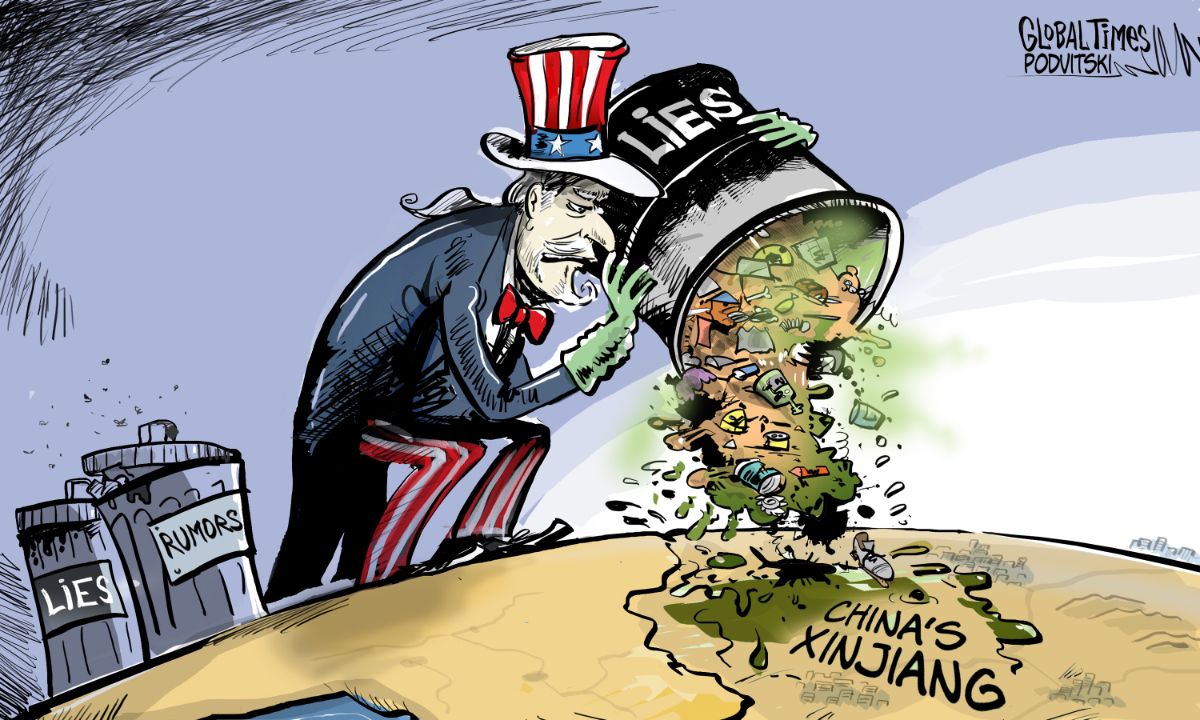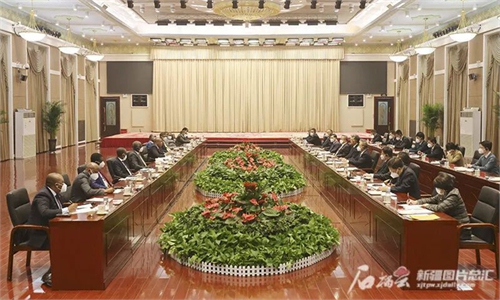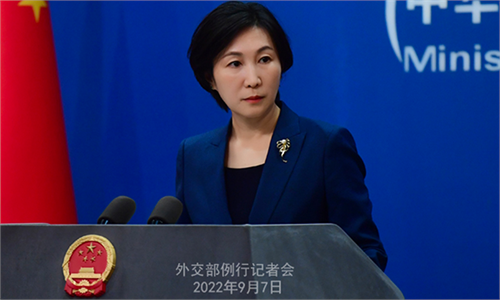
Slandering Xinjiang -- the new normal of the "empire of lies" Illustration: Vitaly Podvitski
Amnesty International reportedly made a submission to the UN Committee on Economic, Social and Cultural Rights in January and some of it surprised me. The report repeated some of the threadbare claims of so-called China's human rights abuse against Muslim ethnic population in Xinjiang Uygur Autonomous Region.I live in China, I've traveled extensively, including many kilometers across Xinjiang. First in 2014 when I cycled from Macao to the Kazakhstan border, and again in 2019, I flew to Urumqi and cycled home to Guangdong. In doing so, I passed through several Xinjiang cities, many towns and countless villages, met with Uygurs, ate in their restaurants and watched as they went to their mosques.
I saw enhanced security, there are a lot of police officers, but I saw no oppression and certainly no abuses or crimes against humanity. It's easy to say: just because I didn't see it doesn't mean it isn't happening and I accept that, but what I did encounter was friendly, welcoming people who weren't afraid to invite us into their homes, who gave us gifts of fruit or bottled water and wouldn't take payment for their kindness.
When you see people like this, you realize that they aren't oppressed, they live normal, but simple lives. On the occasions I asked about the enhanced security, the only answer I received was, we feel safer than before; I can accept that people in the cities may have been programmed to say this but surely, the shopkeeper in the village, the farmer in the fields and the waiter in the restaurant can't all keep to the same script without at least one of them giving some indication that they aren't telling the truth.
I should add here that I've been trained in interview techniques, I've learnt how to tell when someone is lying and, for sure, some people can tell a lie and get past a trained, even a skilled observer, but definitely not all of them.
Call me a denialist, I'm certain many will, but the fact is, inside Xinjiang, there is no evidence and no visible indicators that any form of oppression is going on, nor that Uygur people are being singled out for harsh treatment, or that Muslims are in any way oppressed. It just isn't visible anywhere in Xinjiang, other Muslim populated regions I've cycled through such as Gansu, Ningxia Hui Autonomous Region, or anywhere else in China for that matter.
Over the last three years, I've experienced lockdown, quarantine and a range of restrictions due to COVID-19. Every single person I spoken to in China, who is Chinese, supported these restrictions but had some complaints about personal inconveniences. Even the Edelman Trust Barometer which stood at 91 for China last year and fell to 89 this year is an indicator that Chinese people believe the restrictions were appropriate. The fact that, at the time of writing, globally, almost 7 million people have died of COVID, tells Chinese people that their government were right to prevent that happening in China.
So, I'm surprised that this Amnesty report dedicated more of its pages to these two things. The report doesn't make allegations: it makes statements, without any admissible evidence, that China is carrying out crimes against humanity using "former detainees, satellite imagery and data" as sources.
It says many groups have been oppressed or imprisoned for practicing religion. It also says that "recent regulations" have further tightened the government's grip on religious practices and ethnic minority groups and then goes on to cite only the regulations related to de-extremism in Xinjiang adopted six years ago, on March 29, 2017 and translated by Yale University's China Law Translate. Take a few moments to read the English version of these and it's hard to find anything in these laws to disagree with, or which aren't imposed in other countries where religious extremism has been a problem.
The report has 42 footnotes and 28 of them, in circular references, link the reader to previous Amnesty International reports. Of the others, several are Chinese media cited to demonstrate human rights abuses exist, but which confirm action is being taken such as this Global Times report where 17 people were punished by China for human trafficking. Proving that China is indeed working hard to stamp out these crimes. But then, if the perpetrators were sentenced to death for such heinous crimes, there would be an outcry from Amnesty for that.
There are many aspects to Amnesty's 16 page report but all of them share the same issues, they provide no methodology, no evidence from anyone inside of Xinjiang or even China, other than unsubstantiated Weibo videos in support, and the satellite imagery referred to is not referenced at all. Could this be because it is the already debunked US funded, Australian think tank, ASPI report?
As a submission to a UN Committee, it isn't one to be taken seriously. It rehashes old reports, makes unsubstantiated allegations, uses already discredited examples and provides no balance. There is no evidence that people within China were consulted nor that any effort was made to verify the truth of allegations given to Amnesty by people outside of China, all of whom appear to have left China with a government issued passport by legitimate means.
The author is a British Australian freelance writer who has studied cross cultural change management in China and has lived in the country, traveling extensively for 18 years. opinion@globaltimes.com.cn


